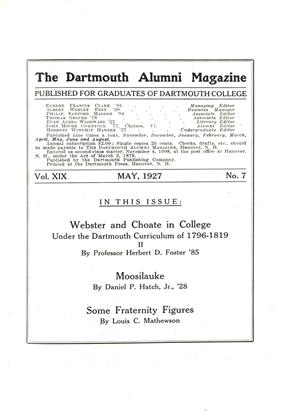(From The Hartford (Conn.) Times)
One must not render snap judgment on President Ernest Martin Hopkins's novel suggestions for the improvement of intercollegiate football. The Dartmouth educator may be making a mental forward pass of historically effective character. President Hopkins is a man of much more than average intelligence. He has given this matter long attention and thought and before giving his views utterance has taken what he considers able counsel. Certainly they have some points of appeal.
The abolition of professional coaching would help to render football less of an institution and more of a sport. Removal from the varsity squads of seniors as freshmen have been eliminated in the past would operate to diminish the numbers of those who go to college to play football instead of genuinely seeking the academic advantage. Requiring each college to have two varsity elevens, one to play at home, and the other to take the responsibility of the visiting games, would give more chance for players to win their letters and would double the sociability of intercollegiate relations.
But these suggestions are too radical for at all immediate acceptance. They risk too much. Amateur coaching means inevitably upon the average a vast deterioration in the standard of play. Taking the seniors from the squad means that the player who matures slowly is to be precluded from maturing at all. He toils three years in the grime of the gridiron for nothing. It is hard enough for a college to put one first class eleven on the field. Can redoubling the labor tend to diminish undergraduate absorption in the effort? Is anything satisfactory to be gained through multiplying the schedules by two ?
Initial impression is that what President Hopkins has thrown, into the world of college football is not a bombshell but something which merely resembles one. That is to say, it smokes and will blow up. But that it will have accomplished anything more than momentary noise, seems improbable. Yet time may reveal more important results.
 View Full Issue
View Full Issue
More From This Issue
-
 Article
ArticleWEBSTER AND CHOATE IN COLLEGE
May 1927 By Herbert Darling Foster '85 -
 Article
ArticleTHE UNDERGRADUATE CHAIR
May 1927 -
 Article
ArticleMOOSILAUKE
May 1927 By Daniel P. Hatch, Jr. '28 -
 Article
ArticleSOME FRATERNITY FIGURES
May 1927 By Louis C. Mathewson -
 Article
ArticleDARTMOUTH STUDENTS SAID TO BE IRRELIGIOUS
May 1927 -
 Class Notes
Class NotesClass of 1921
May 1927 By Herrick Brown








